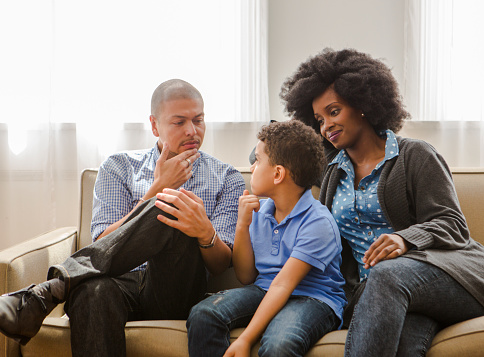Many parents assume that puberty is the time to have “The Talk” with kids. It’s a rite of passage to adolescence with their changing bodies and escalating hormones!
However, in order to build a solid foundation of communication, it’s really important to talk to your kids about bodies and relationships early. How early? Well, as early as grade school!
Here are eight things you should know when talking to young kids about sex ed.
1: It’s never too early to have “The Talk”
Talking to your kids about sex ed at a young age may feel silly at first. Keeping the conversation age-appropriate and relevant to their questions will put you both at ease. It’s totally normal for children to be curious about their body and the bodies of the other sex, so find the perfect opportunity to talk about body parts. Try to teach the anatomically correct words for body parts and encourage bodily autonomy (e.g., you are the owner of your body).
2: Brief, more frequent talks are more effective than one big talk
The most effective way to talk to kids about sex ed topics is to keep it short and sweet! Brief, more frequent touchpoints are so much more impactful than one long conversation.
3: You can’t share too much
A common concern from parents is that they’re worried about sharing too much too soon. But the reality is, kids will absorb what they are developmentally ready to absorb. If you start talking over their head or sharing too much detail, they will tune you out! Having these conversations early will make your kids more comfortable coming to you later on.
4: Kids just want the basics
When a young child asks where babies come from, they are being 100% literal. They just want to know the science of how a new life comes to be; they don’t want to know about intimacy! So answer the question in a basic, factual way.
5: It’s on YOU to start a conversation
Many parents think that if their kid doesn’t ask about a sex ed. topic, it’s because they aren’t ready. But think back to when you were a kid; did you jump up wildly to ask your parent or guardian questions about sexuality? Probably not! Use everyday moments (like when they start up with the potty talk) to naturally start a conversation. The longer you wait, the more likely it is they will get their information somewhere else first.
6: You don’t need to know all the answers
The ultimate goal is for you to be the primary source of health information for your child. It’s perfectly fine if you don’t always have the answers! In fact, one really powerful way to build your relationship with your kid is to say, “That’s a great question! I don’t know the answer but how about we look it up together?”
7: There are no gender rules
There are no gender rules when it comes to sex ed conversations. Moms can talk to sons and dads can talk to daughters about health and bodies! In fact, being able to have conversations irrespective of gender will help your kids develop an inclusive frame of mind in other spaces too.
8: You need to discuss consent
So here’s the thing about consent; it’s crucial that you start these conversations early, and the conversation has NOTHING to do with sex. With young kids, it’s all about bodily autonomy and teaching kids to know their own boundaries and respect other people’s boundaries.
For example, if you’ve got a super affectionate kid, teach them that not everybody wants hugs all the time. And if you have a kid who is less outwardly affectionate, teach them that it’s perfectly OK to do a high five instead of a hug. Ultimately, these early conversations will position your kids to tune in and be empathic human beings.
Debra Hauser is the President of Advocates for Youth, a nonprofit that partners with youth leaders, adult allies, and youth-serving organizations (like AMAZE.org) to advocate for policies and champion programs that help young people make informed and responsible decisions about their reproductive and sexual health.





